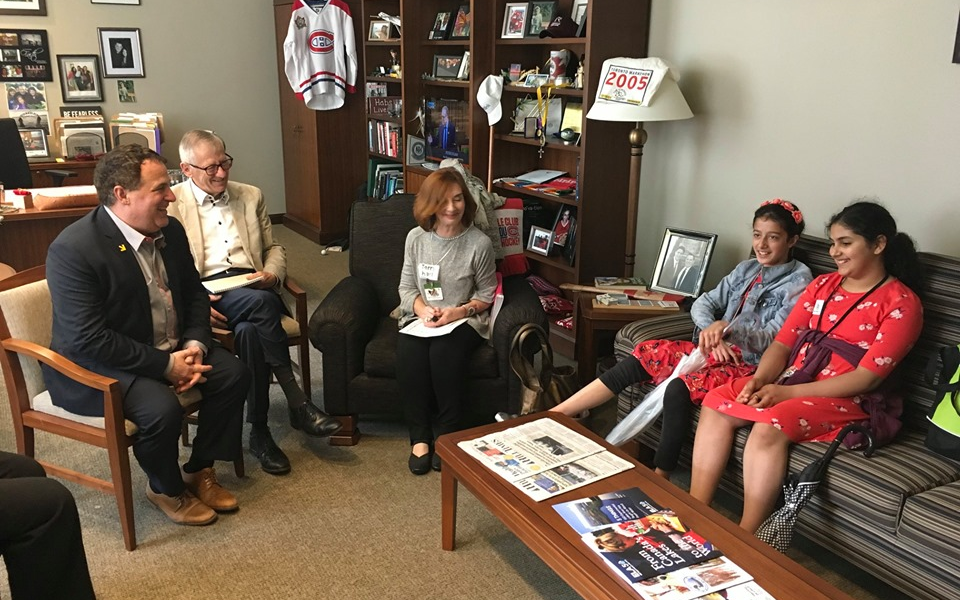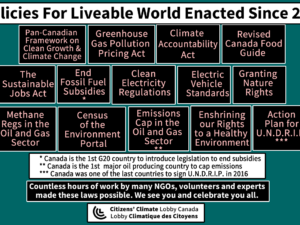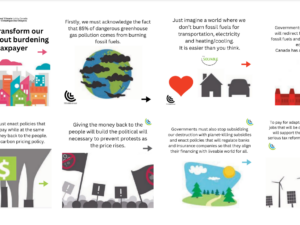For Immediate Release: May 27, 2019 Ottawa ON: For the 14th time Citizens’ Climate Lobby (CCL) volunteers lobbied together on Parliament Hill on May 14, 2019. Among the 31 lobbyists included eight newly trained climate leaders, and three Fridays For Future youth strikers. Together these citizen lobbyists met with 19 of parliamentarians from all four political parties and brought solutions to solve the most urgent crisis of our time – the climate crisis. On May 13, the volunteers participated in five hours of training and community building. The real life consequences of climate catastrophe were vividly described when a CCL volunteer told the harrowing story of her adult children and grandchildren that were trapped on a Caribbean Island after Hurricane Irma. They dodged pirates, and escaped machete-wielding convicts for weeks while searching for food, water, shelter and rescue from their dire circumstances after their entire island was flattened and complete social breakdown reigned around them. Three Fridays For Future youth gave speeches, led adults in a participatory dance and held their ground in a mock media interview – thereby showing adults who were the leaders in the room. Lawyer Josh Ginsberg from Ecojustice walked the volunteers through the details of the Saskatchewan Ruling and how the federal government’s Greenhouse Gas Pollution Pricing Act is constitutionally valid. Two key rulings were that the “GHG pricing is regarded as essential” and “Climate change is doubtless an emergency in the sense that it presents a genuine threat to Canada.” Communicating the urgency of the climate crisis effectively was paramount in the minds of all the volunteers. Vince Schutt from Environmentum expertly guided to new levels of communication with Motivational Interviewing techniques. Youth, scientists, local governments and citizens worldwide demand major changes to keep global warming below 1.5 °C and to have a chance of protecting our future from worldwide ecological collapse. Recent reports, such as the IPCC 1.5°C Report, Canada’s Changing Climate report, the UN 1 Million Species Extinction report and the latest Mauna Loa CO2 reading of 415 ppm, highlight the need for urgent action. As of May 6, 2019, climate emergencies have been declared in 382 Canadian communities, covering over 10 million people. In August 2018, teenager Greta Thunberg from Sweden sparked the global Fridays for Future movement by striking from school to demand that leaders protect her future. On March 15, May 3 and May 24 thousands of Canadian youth are part of these Fridays For Future climate strikes. An international week of climate strikes is set for the week of September 20. “Our present challenge calls for a whole suite of beneficial solutions. With the right policies, including pricing carbon as a core component of a cost-effective climate plan, we can help save lives, improve health, conserve nature, promote equity and be poised to capture part of the 26 trillion dollar opportunity in climate smart growth by 2030,” said Cathy Orlando, CCL Canada’s national director. Politicians were specifically lobbied for the following: “Our volunteers went to Parliament Hill to help make sure that Canada continues to improve its commitments to protect civilization and all life from climate catastrophe. We want Parliamentarians to treat the climate crisis as the nonpartisan issue that it truly is,” said Orlando. CCL Canada’s Pledge for 2019 Please click here for the Make Tomorrow Conference Photo Album on Facebook. ### MEDIA RELEASE: Citizen Lobbyists Bring Non Partisan Message to Solve the Most Urgent Challenge of Our Time
 Recent reports, such as the IPCC 1.5°C Report, Canada’s Changing Climate report, the UN 1 Million Species Extinction report and the latest Mauna Loa CO2 reading of 415 ppm, highlight the need for urgent action.
Recent reports, such as the IPCC 1.5°C Report, Canada’s Changing Climate report, the UN 1 Million Species Extinction report and the latest Mauna Loa CO2 reading of 415 ppm, highlight the need for urgent action.
In 2016 our volunteers made a pledge: I acknowledge that there is a risk of losing political resolve on the gains we have made to secure a healthy climate in the lead up to the federal election in 2019. Thus, I am making the following pledge: I want to live in a democracy where all politicians of all stripes can get elected for pro-environmental policies not in spite of them. Thus, in my riding, I pledge to generate the political will for a liveable world. Specifically, I pledge to do my best to keep the discussions around the climate crisis and carbon pricing factual, respectful and non-partisan in my local media while doing community outreach and communicating with local leaders. All politics is local after all.
MEDIA RELEASE: Citizen Lobbyists Bring Non Partisan Message to Solve the Most Urgent Challenge of Our Time
Home » CCL Canada News » MEDIA RELEASE: Citizen Lobbyists Bring Non Partisan Message to Solve the Most Urgent Challenge of Our Time
MEDIA RELEASE: Citizen Lobbyists Bring Non Partisan Message to Solve the Most Urgent Challenge of Our Time
Posted on May 23, 2019 in Media Release






